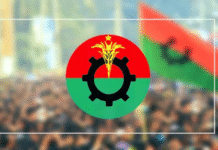FIELD Marshal Mohammad Ayub Khan, Pakistan’s first military dictator, died thirty nine years ago on April 20, 1974. In all these years, not much has been said or written about him, though his putative diaries were published in Pakistan a few years ago. And then there is his son Gohar Ayub Khan’s ‘Glimpses into the Corridors of Power,’ where certain references to the man who imposed the very first martial law on Pakistan and who thereby set a very ugly precedent for ambitious soldiers in Pakistan and Bangladesh, have been read with interest by subcontinental scholars of history.
How do we remember Ayub Khan in Bangladesh? Our memories of the man necessarily have to do with the manner in which he and Iskandar Mirza undermined constitutional politics through seizing the state of Pakistan by force on October 7, 1958, at a time when the country prepared for its first general elections scheduled for February 1959. Twenty days after the coup, Ayub elbowed Mirza aside and pushed him into exile. For the next ten years, Ayub’s fiat ran throughout the two wings of Pakistan, with political parties and leaders bearing the brunt of his excesses. Under the Elective Bodies’ Disqualification Ordinance (EBDO), he put well-known political figures out of circulation. A young Sheikh Mujibur Rahman was a particular target of Ayub’s wrath and would suffer till 1969. The respectable Huseyn Shaheed Suhrawardy was carted off to prison. Adult suffrage was replaced by a pliant electoral college called Basic Democracy.
As Pakistan’s president, Ayub Khan presided over a wholesale change in the country’s political tradition. A culture of sycophancy grew and was promoted to the hilt by the regime. In East Pakistan, a non-entity like Abdul Monem Khan served as governor, to the intense embarrassment of the Bengalis. A horde of other Bengalis hitched on to the Convention Muslim League bandwagon, Ayub’s political vehicle, and naturally stayed in thrall to the dictator. In West Pakistan, it was a similar picture that shaped up. Manzur Quadir, Syed Sharifuddin Pirzada, S.M. Zafar and others came to prominence in Ayub’s shadow. His favourite minister, the young and brash Z.A. Bhutto, called in 1963 for Ayub Khan to be declared president for life. Only three years later, he would turn against his benefactor on the basis of the lie that a secret clause in the Tashkent Declaration had undermined Pakistan’s case after the 1965 war with India.
In 1967, the field marshal produced a book, which some believe was ghost written, he called ‘Friends Not Masters.’ It was an exercise in self-adulation. It was, for the Bengalis, the ultimate insult, for Ayub made it clear in the work that the Bengalis were a non-martial race. A mere four years later, these non-martial people threw the mighty Pakistan army out of East Pakistan to create Bangladesh. In 1966, Ayub dismissed Sheikh Mujibur Rahman’s Six Points as a secessionist conspiracy and vowed to exercise the language of weapons against its votaries. Three years later, he had not only withdrawn the Agartala conspiracy against Bangabandhu but was also to welcome him to the Round Table conference in Rawalpindi and, at one point, offer him the position of Pakistan’s prime minister.
Ayub’s hand-over of power, in the midst of a relentless popular movement against him, was a violation of the constitution he had devised for Pakistan in 1962. Rather than transfer power to the speaker of the national assembly, he had General Yahya Khan, the army chief, impose yet one more spell of martial law on Pakistan. That was in March 1969. After that, Ayub Khan was not seen or heard of again, save for his appearance in 1972 before the Hamoodur Rahman Commission set up by the Bhutto government to inquire into the causes behind Pakistan’s battlefield defeat in Bangladesh in 1971.
In retirement, we have it on impeccable authority, Ayub Khan advised Yahya Khan that a political solution be found to the crisis as it erupted in the country in early March 1971. Yahya ignored the advice. Over the next few months, the fallen dictator wrote to his successor twice, suggesting that with Sheikh Mujibur Rahman being in Pakistan’s captivity, the regime should work out a deal with the Bengali leader to save Pakistan in its tottering eastern wing. Pakistan, thought Ayub Khan, might not remain a federation any longer. But perhaps a deal with Mujib could lead to a confederation of the two wings? Yahya stayed silent.
Ayub Khan’s funeral was well-attended. His former protégé Bhutto stayed away from it, though. A few days later, he turned up with wife Nusrat at the Ayub family home, offering the excuse that he was absent because issues of his security were involved.
Thus did the field marshal pass into the backwaters of time.
The writer is Executive Editor, The Daily Star. E-mail: ahsan.syedbadrul@gmail.com
Source: The Daily Star











The answer to the question “Thus did the field marshal pass into the backwaters of time” depends on who asks it. But one point is important here, Mr Ahsan may please note, that Ayub was wiser to suggest Yahya to find out a political solution for East Pakistan problem and things would have been very different for Pakistan (both East and West Pakistan) if Yahya listened to him. As an ordinary citizen of Bangladesh I believe and I have reasons for believing so that, dictator Ayub was better (Please don’t misunderstand me, I support no dictator) in understanding things than pseudo dictator Mujib or drunkard Yahya.
Why are we even talking about these guys? Let them be where they belong – in the trash can of history. Stirring the trash can only spread the stink.
Most Bangalis are headstrong, irrational, illogically emotion-driven and above all myopic and therefore never bother to listen to even such ‘god’ as Rabinndranath Tagore they almost worship. Did he not say, ‘Blow up even a heap of ash and you might find invaluable gems there.’ To find fault with everything they don’t like (jare dekhte nari tar chalan baka) is their basic characteristics. Those who have gone though his ‘Friends not Masters’ might have found so many facts that could not be slighted away. Take one example: Mr. Nazimuddin, he said in one place, had a unique quality of ‘solving’ problems. Whenever any such problem was put before him, he kept the file under a heap of files until the problem solved itself. (Forgive me if my memory slipped). Isn’t the same tradition we are following? Or what progress have we achieved during the last four and a half decades? Isn’t it during his time that Khulna became the third biggest industrial city of Bangladesh and what is it now? Has anyone compared his ‘decade of development’ with the ‘half a century of development’ in post-liberation period? Where is the Adamjee Jute Mill that our Bangali leaders called a golden-egg-laying industry? What about the Chittagong re-rolling mills? Above all, was the ‘Agartala Conspiracy Case’ false? Really? But late A. Razzaque, late JSD leader Arif (killed) and so many others testified it in Weekly Bichitra (before the weekly was sold out to Sheikh family (?) that the conspiracy was a fact but due to the lack of Sheikh Mujib’s wholehearted support for an armed rebellion, they could not go forward with it. However, there are many other facts that are true of us Bengalis even today. Maybe there are bad things in that book also but we did not care to make amends with our own flaws and have always blamed others for our misfortune. The result is very brazen before us. We have not been able to unify our nation even on matters of our national security, safety and sovereignty and instead, have been divided on countless lines. It seems we shall never learn anything from history.